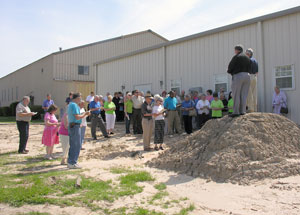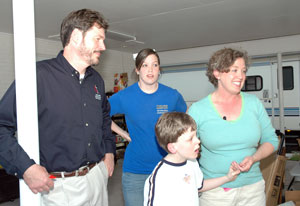Work teams continue to help in Mississippi
By Neill Caldwell*
GULFPORT, Miss. (UMNS) - It gives a whole new meaning to "wrong side of the tracks."
Train tracks run parallel to the beach and the two major roadways along the Mississippi Gulf coast, Highway 90 and Interstate 10. When Hurricane Katrina slammed ashore Aug. 29, the damage above those tracks was significant. But between the slightly elevated railroad tracks and the beach, it was like Katrina's giant hand had scrubbed the ground clean. A huge wall of water pushed in by the storm smashed buildings down to their cement slabs, and when the water receded, it carried the debris back out into the gulf.
When people here say something was "below the tracks," that means it is gone.
Today, most areas don't look much different than they did the day after the storm. But work is happening that will eventually change all that. Local residents and volunteers from all over the nation, including many United Methodist teams, continue to pour in. The church is providing support in many ways, and plans call for building additional warehouses to help the effort.
"It was January before we had drinkable water," says the Rev. Terry Lynn Hilliard, pastor of First United Methodist Church in Pass Christian. "I'm amazed at how unprepared we all were. I lost two cars that were parked 40 miles apart and all my belongings. I had to wade through waist-deep water to get into my in-laws' house."
About a third of the members at First Church have moved to other areas and probably won't be back.
"I'm 65 years old, and I don't ever think I will see it back like it was," says Ed Blakeslee, disaster relief coordinator for the United Methodist Church's Mississippi Annual (regional) Conference.
Warehouses planned
On Highway 49, at a United Methodist Committee on Relief warehouse, several tractor-trailers unload supplies for the relief effort each week. If it's a hot commodity - building materials such as Sheetrock, shingles or insulation, for example - it's gone in a matter of hours. The warehouse also has a food pantry and space to store heavy equipment.
So far it's the only warehouse in the area, but Blakeslee says the plan is to build three more of these multipurpose buildings, one for each of the conference's four damage zones in southern Mississippi. It will take $200,000 to $300,000 to accomplish that goal.
"The government was not ready for this storm," Blakeslee says. "And I mean all of them: local, state and federal. The organization that stepped forward was the church. Faith-based organizations didn't have a plan; they just did what needed to be done."
Just south of the warehouse at Gateway United Methodist Church, about 10 miles inland, work teams rotate in and out each week. It's become a command post and housing center for volunteer workers. United Methodist work teams crowd just about every inch of free space at Gautier United Methodist Church, just a mile from the coast, where the Family Life Center and several Sunday school classrooms have been turned into living space. Teams are fed three meals a day and sleep on cots, with fabric hung from PVC pipe providing a small level of privacy. No one complains.
Pastor Ron Stanley has been at Gautier for nine years and says he wished his seminary had offered "Katrina 101." "I've learned to roll with the punches," he says. "I grew up on a farm and was able to do just about everything."
Working together
The Mississippi Conference has received thousands of workers since Katrina struck. It has worked to support the local churches, which are providing space for the workers. The conference also has helped provide food, water, housing and other resources, and it has scheduled reconstruction efforts. Churches that were still standing are providing worship space for those that were destroyed, sometimes with a different congregation in each corner of the sanctuary.
Few street signs remain, having been blown or washed away. People have created hand-lettered signs for key intersections, but otherwise locals need to guide work teams out or they'll get hopelessly lost.
In the houses, crews first rip out everything because the mold is so bad. Once down to the framing, the walls, floors and ceilings are reconstructed, and then paint and carpet are added. Unskilled workers are assigned to "clean up," a nice way of saying "mucking out" the destroyed homes. Skilled workers - carpenters, plumbers, roofers - are needed most.
"It's amazing to see how this storm has affected the local churches," says Robert Sharpe, the Seashore District coordinator for disaster response. "The Catholics, the Baptists and the Methodists are all working together."
Sharp says that while UMCOR is not always the first on the scene, it is always the last, being committed to staying until the job is completed long after other denominations and secular groups have packed up and gone home. "The United Methodist Church will still be shining five years from now, when everyone else has pulled out."
Mississippi Annual Conference Volunteers in Mission will go out to annual conference meetings around the denomination this summer to thank United Methodists for their open hearts. They want to do it in person.
Says Hilliard: "We have a lot of payback to do when all this is over."
*Caldwell is a freelance writer based in High Point, N.C.














